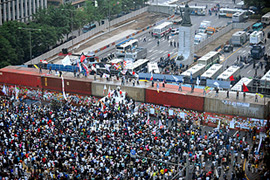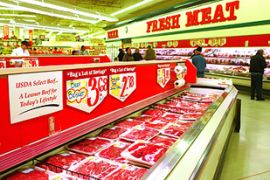“The key would be for American exporters to work with Korean importers to come up with some kind of system, or mechanism, that would be transparent to the Korean consumers,” Arvizu told reporters.
“That’s something that this administration will certainly support.”
Korean anger
Such an approach could be a way to address anger in South Korea without altering an April agreement that fully resumes beef imports that were banned after a case of mad cow disease was detected in the US in 2003.
South Korea was the third-largest overseas customer for US beef until it banned imports.
In April, Lee Myung-bak, South Korea’s president, struck a deal with his US counterpart, George Bush, to reopen South Korea’s beef market
The accord was supposed to have settled a major irritant in ties between the allies, but tens of thousands of anti-government protesters have since taken to the streets to voice concerns over the safety of US beef and demand Lee’s resignation.
Protesters are angry at the way Lee appears to have submitted to American pressure.
One protester told Al Jazeera that Lee had “submissively accepted all conditions from the US to sign this deal”.
Deadline set
Protesters have given the government a June 20 deadline to come up with a better deal on the US beef imports.
The entire South Korean cabinet offered to resign this week to quell public outrage.
 |
Protesters are unhappy that Seoul appears
to have submitted to US pressure [AFP] |
Younger cattle are believed to be less susceptible to mad cow disease, or bovine spongiform encephalopathy (BSE), a brain-wasting illness scientists say spreads when cattle is fed with recycled meat and bones from infected animals.
The US banned recycled feeds in 1997 and Seoul and Washington both say that US beef is safe, citing the Paris-based World Organisation for Animal Health.
Beef age is an important matter for South Korean officials, who are in Washington looking for assurances that the US will not ship beef from cattle older than 30 months, even though the recently signed pact would allow it.
The visiting South Korean officials have told US legislators that banning older cattle would “go a long way to resolving the issue in Korea”.
Seoul blamed
Ben Nelson, a Democrat from the cattle-producing state of Nebraska, opposed banning older cattle, saying the move might prompt other countries to demand such concessions.
“They created the problem; they’re going to have to find solutions,” he said, blaming the South Korean government for successfully stoking fears that US beef was unsafe.
“Now, it’s like trying to un-ring the bell or unscramble the eggs, and they’ve got a serious problem. It does threaten their government.
“Unfortunately, they’ve made their own nest.”
The Bush administration has said it will not renegotiate the deal and had earlier appeared unwilling to help offer concessions to help ease the pressure in Seoul.
Chuck Conner, the US deputy agriculture secretary, said on Wednesday that there are “national protocols that we have negotiated with the Korean government, and we do not intend to renegotiate those protocols”.
But Arvizu’s comments that age labels could help ease tensions in Seoul will give hope to South Korea’s trade minister, Kim Jong-hoon, as he arrives in Washington on Friday to meet Susan Schwab, the US trade envoy.



